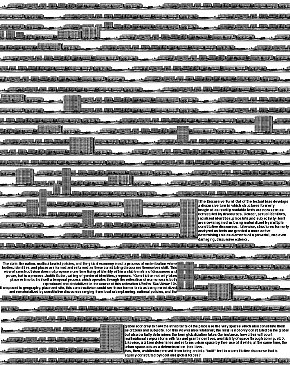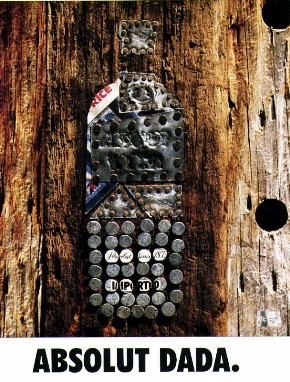2004.05.08 12:25
Re: Unintended Consequences
Marie Antoinette, Ludwig II, and "Eva" just informed Otto that the correct title of their co-authored paper is "Here a Versailles, There a Versailles, Everywhere a Versailles, sigh."
2004.05.09 12:42
Re: Unintended Consequences
Ludwig's choice for title was indeed "The Versatility of Versailles", and Eva liked "Versailles' Demise", but Marie A. simply found no more reason to disguise the fact that all three of them were grand old quacks.
e i e i o
2004.05.10 15:17
Re: ducked around ?
"imaginative history" is a kind of virtual reality, is it not?
As much as I see the virtual domain as something other, there nonetheless remains the wide held notion that the distinction between the real and the virtual is increasingly blurred in our times. I like extremes, so The Odds of Ottopia strives toward an extreme blurring of the real and the virtual. Remember, the Otto here is the real great virtual King of Bavaria.
Reenactment is a kind of "imaginative history", is it not?
2004.05.11 15:03
Re: ducked around ?
P, you say "I would say history is already written, no way to reenact it," but written history is itself a reenactment in that those that write history either 'recollect' events that they themselves already experienced or it is written by people that never even experienced the events they write about.
The whole premise of Collingwood's The Idea of History is that for historians to more accurately write history they have (at least mentally) reenact the past events.
A few years ago Otto learned that the first psychiatric hospital of the USA, Friends Hospital in Philadelphia, is situated in 'ancient' parkland along Tacony Creek and that, although now-a-days surrounded by dense urbanism, there are still deer in the park. This immediately reminded Otto of his many years of confinement at Schloss Fürstenried and the deer in the park there. Otto visited Friends Hospital for the first time in 1999, and that is when he first met Gordon Matta-Clark who lived "across the street." Gordon subsequently introduced Otto to Eva--in the years immediately after his death Gordon lived at the dilapidating Whitemarsh Hall. Otto thereafter introduced Eva to Ludwig, knowing that they would immediately like each other since they both reenacted Versailles. And from these modest beginnings emerged the Horace Trumbauer Architecture Fan Club.
Also P, the galaxies, etc. that we see in the night sky are all very much a view of the past (as in light years ago), and strictly speaking not at all the future.
| |
2004.05.12 09:27
In Search of Planet Quack?
"In March 1873 a distinguished Bavarian public servant named Franz von Löher left Munich bearing instructions from the King for what must have been the strangest assignment of his life. His task was to find a piece of foreign territory where Ludwig could set up a new kingdom. This was no superficial whim on the King's part. If he could not make Bavaria live up to his ideals, very well, he would not be content with creating retreats for himself in the country. He would start all over again somewhere else. He would find some unspoilt tract of land across the sea -- a tabula rasa on which he could write his dreams afresh."
"[Löher's] first voyage took him via Spain to the Canary Islands, along the north African coast to Constantinople, around the Greek and Turkish islands and then home, a journey lasting from March to July 1873. On his return he drew up a detailed report which he presented to the King at the beginning of August. This and subsequent reports of a similar kind are preserved in the Secret Archives of the Royal House."
--from chapter 13, "Dreams of El Dorado" of Christopher McIntosh's The Swan King: Ludwig II of Bavaria.
"Beginning in the late 1870s the territory [Belgian Congo] was colonized by Leopold II, king of the Belgians (reigned 1865–1909). Leopold believed that Belgium needed colonies to ensure its prosperity, and sensing that the Belgians would not support colonial ventures, he privately set about establishing a colonial empire."
--The Columbia Encyclopedia online
The growth of the Jewish population in Palestine was resented by the Arabs who expressed their hostility by fomenting bloody riots in 1920, 1929, 1933 and 1936-39. The most tragic was the massacre of the ancient Jewish community of Hebron in 1929.
In order to resolve the conflict, on November 29, 1947 the UN voted in favor of a Partition Plan which provided for two independent states, one Jewish, one Arab, while Jerusalem would be internationalised.
Although there was hesitation among the Jewish public, it was decided to accept the Plan, notwithstanding that the area allotted to the Jewish State was, once again, considerably reduced.
The Arabs rejected the plan outright. Contemptuous of the will of the world, bands of Palestinian Arabs, aided by irregular volunteers from neighboring countries, attacked Jewish communities and clashed with the Hagana defense force. With the termination of the UN Mandate on May 14, 1948 the British forces had withdrawn from Palestine. Regular troops of the armies of Egypt, Iraq, Transjordan, Syria, and Lebanon invaded the country, along with volunteer detachments from Saudi Arabia, Libya, and Yemen.
"The Arabs intend to conduct a war of extermination and a momentous massacre which will be spoken of like the Mongolian massacre and the Crusades," declared Azzam Pasha, secretary-general of the Arab League, on the BBC, May 15, 1948.
--info.jpost.com/
Israel became a state on May 15, 1948, and was recognised by the United States and the Soviet Union that same day.
--news.bbc.co.uk
17 July 1955
Disneyland opens. 28,154 attend. 90 million watch on ABC.
| |
2004.05.13 15:49
du-da du-da
are we there yet?

cologne or toilet water?

sprechen sie?

makes a nice painting, don't it?

well don't it?

kitty litter bug

| |
2004.05.14 13:31
Papers of the Horace Trumbauer Architecture Fan Club Convention
Reenactionary Bilocating Architecturism
Saint Catherine de Ricci and Louis I. Kahn
Nudist Camp at the Philadelphia Museum of Art
Marcel Duchamp and C. Paul Jennewein
a moldy paper on mildew
Gordon Matta-Clark
De Spectaculis II
Quintus Septimus Florens Tertullianus and John the Baptist Piranesi
The Promenade Architecturale Formula
Le Corbusier
The Marriage of Twisted and Columns
Eutropia and Pieter Pauwel Rubens
The Architecture of Constantine the Great
Saint Helena, Eutropia, Eusebius Pamphili, and Saint Ambrose
Here a Versailles, There a Versailles, Everywhere a Versailles, sigh
Marie Antoinette, Ludwig II, and Lucretia "Eva" Bishop Roberts Cromwell Stotesbury Dougherty
As Gordon often like to say, "Rusty ain't the half of it."
2004.05.14 14:39
bilocation, bilocation, bilocation
Louis I. Kahn, with Helena, Eutropia, and Catherine de Ricci, is visiting Israel today--a modern birthday visit. Melania the Elder and Melania the Younger saw to all the prior arrangements--"They gave up all their Roman wealth to die (there) in poverty, you know." Mamre (near Hebron), specifically the site of Abraham's altar, is their last stop, and they all know that Eutropia is going to get very emotional.
"I consider it necessary to detail the proceedings of Constantine in relation to what is called the oak of Mamre. This place is now called Terebinthus, and is about fifteen stadia distant from Hebron, which lies to the south, but is two hundred and fifty stadia distant from Jerusalem. It is recorded that here the Son of God appeared to Abraham, with two angels, who had been sent against Sodom, and foretold the birth of his son. Here the inhabitants of the country and of the regions round Palestine the Phoenicians, and the Arabians, assemble annually during the summer season to keep a brilliant feast; and many others, both buyers and sellers, resort thither on account of the fair. Indeed, this feast is diligently frequented by all nations: by the Jews, because they boast of their descent from the patriarch Abraham; by the Pagans, because angels there appeared to men; and by Christians, because He who for the salvation of mankind was born of a virgin, afterwards manifested Himself there to a godly man. This place was moreover honored fittingly with religious exercises. Here some prayed to the God of all; some called upon the angels, poured out wine, burnt incense, or offered an ox, or he-goat, a sheep, or a cock. Each one made some beautiful product of his labor, and after carefully husbanding it through the entire year, he offered it according to promise as provision for that feast, both for himself and his dependents. And either from honor to the place, or from fear of Divine wrath, they all abstained from coming near their wives, although during the feast these were more than ordinarily studious of their beauty and adornment. Nor, if they chanced to appear and to take part in the public processions, did they act at all licentiously. Nor did they behave imprudently in any other respect, although the tents were contiguous to each other, and they all lay promiscuously together. The place is open country, and arable, and without houses, with the exception of the buildings around Abraham's old oak and the well he prepared. No one during the time of the feast drew water from that well; for according to Pagan usage, some placed burning lamps near it; some poured out wine, or cast in cakes; and others, coins, myrrh, or incense. Hence, as I suppose, the water was rendered useless by commixture with the things cast into it. Once whilst these customs were being celebrated by the Pagans, after the aforesaid manner, and as was the established usage with hilarity, the mother-in-law of Constantine was present for prayer, and apprised the emperor of what was being done. On receiving this information, he rebuked the bishops of Palestine in no measured terms, because they had neglected their duty, and had permitted a holy place to be defiled by impure libations and sacrifices; and he expressed his godly censure in an epistle which he wrote on the subject to Macarius, bishop of Jerusalem, to Eusebius Pamphilus, and to the bishops of Palestine. He commanded these bishops to hold a conference on this subject with the Phoenician bishops, and issue directions for the demolition, from the foundations, of the altar formerly erected there, the destruction of the carved images by fire, and the erection of a church worthy of so ancient and so holy a place. The emperor finally enjoined, that no libations or sacrifices should be offered on the spot, but that it should be exclusively devoted to the worship of God according to the law of the Church; and that if any attempt should be made to restore the former rites, the bishops were to inform against the delinquent, in order that he might be subjected to the greatest punishment. The governors and priests of Christ strictly enforced the injunctions contained in the emperor's letter."
--Salminius Hermias Sozomen, Ecclesiastical History, Book II, chapter 1 (circa 443 AD).
Eutropia tells of how the only time she was at the festival at Mamre was when she was still married to her first husband (i.e., before her marriage to Maximian). She was there along with her husband and their daughter, Theodora. When she wrote to Constantine about the festivals at Mamre, it was via her youthful recollection. She finds it comically tragic how subsequent historians assumed that she wrote to Constantine of Mamre from Mamre itself, and how this misinterpretation engendered a whole series of historical inaccuracies.
|